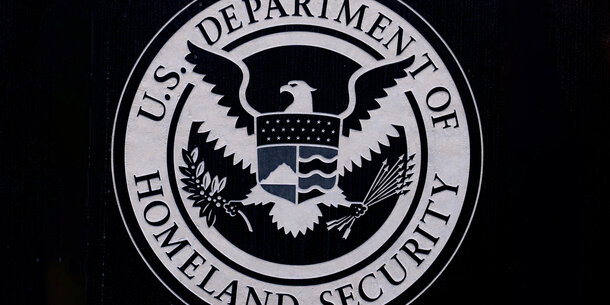The Trump administration’s reported authorization of 600 military lawyers to act as temporary immigration judges would deprive immigrants of a fair hearing and further erode the line between the military and civilian government.
This is true regardless of the professionalism of the military lawyers. Immigration judges are specially trained administrative judges in the Department of Justice who oversee deportation hearings. In late August, the DOJ issued a rule allowing “any attorney” to be selected as a temporary immigration judge, eliminating the previous requirement that temporary judges have years of adjudicatory, litigation, or immigration experience. Multiple news reports on the Trump administration’s authorization of the use of military lawyers followed in early September.
The administration claims that the military lawyers, often called JAGs for judge advocate generals, are needed to alleviate a backlog of cases — but other changes to the makeup of the immigration judge corps undermine that claim. Since the beginning of the year, the DOJ has fired more than 80 immigration judges, all career government employees. Replacing experienced specialists suggests that the DOJ is less interested in impartial adjudication than in trying to build a bench of judges who will support the president’s agenda.
Immigration judges must know immigration law, which the Supreme Court has called “complex” and a “legal specialty of its own.” The DOJ’s practice is to give immigration judges six weeks of training, one year of mentorship by an experienced judge, and two years of quarterly reviews by supervisors, co-workers, and litigants. While the department has said temporary immigration judges will receive the same training, that’s impossible if they are only serving six months. Reporting has suggested their training will be truncated to two weeks.
In addition, ethical rules are fundamental to the rule of law, but the legal and ethical obligations of military lawyers and immigration judges are in tension. By regulation and guidelines, immigration judges are obligated to be impartial. Military lawyers would be bound by those same rules while serving as immigration judges, but even when sent to the DOJ, JAGs remain bound to follow the Uniform Code of Military Justice which requires JAGs to obey a lawful order. Failing to do so risks career consequences or even court martial. That obligation raises questions about whether JAGs would be placed in a position where it would be impossible to be truly impartial.
Moreover, under military ethics rules, JAGs can’t act in a way that is prejudicial to the administration of justice, nor can they represent clients with a conflict of interest. If a military attorney’s usual job is to represent the military as a prosecutor or adviser, simultaneously working for a temporary period as a judge — who does not represent the government — potentially puts the officer in a precarious ethical bind.
A JAG’s legal and ethical obligations to follow orders make it challenging to provide a truly fair hearing to the immigrants in their courtroom, a conundrum with constitutional implications.
The Fifth Amendment guarantees due process regardless of immigration status, a right the Supreme Court unanimously reaffirmed this year. The Court has also made clear that “a fair trial in a fair tribunal is a basic requirement of due process.”
A fair trial in a fair tribunal cannot mean a hearing before a government employee who is generally obligated to follow orders, may have little to no knowledge of immigration law or procedures, and was handpicked by the secretary of defense at the request of the attorney general. Wrong decisions in immigration court can have devastating consequences for individuals and their families, including deporting someone to a country where they will be persecuted or separating family members.
In addition, assigning JAGs to work as immigration judges will pull them away from the important work they are trained and assigned to do, risking military readiness. Although Defense Secretary Pete Hegseth fired senior JAGs because he viewed them as “roadblocks” to the president’s agenda, military lawyers provide critical legal guardrails and guidance.
The novel plan to assign JAGs as immigration judges also raises questions about whether it violates the Posse Comitatus Act, which bars federal armed forces from participating in law enforcement except when expressly authorized by Congress. In the past, military lawyers have been detailed to assist the Justice Department in representing the government. This would be the first time, however, that military lawyers are assigned to serve as impartial adjudicators making decisions about civilians.
Given the unprecedented approach and minimal public information about the legal authority for the appointments, there are other open questions about the legality. For example, it is unclear whether any statute expressly authorizes the assignments, whether the JAGs on assignment would be under military command and control or whether they would report to the attorney general, what the scope of their duties would be, and which agency will fund the details.
Questions also remain as to whether other legal limitations such as the Economy Act — which limits agency spending to the functions appropriated by Congress — would require the DOJ to reimburse the Department of Defense for any assignments. If so, that could be a significant limiting factor. The July funding bill capped the DOJ’s spending at 800 immigration judges. There are 685 immigration judges on the rolls today, leaving space for a maximum of 115 JAGs to be appointed.
In addition to questions about its legality, this plan is simply a bad idea. It undermines public trust in the immigration courts and the military, and it furthers Trump’s pattern of misusing the military. The president has used military aircraft for deportations flights, deployed National Guard and Marines to assist with immigration enforcement, and set up military zones at the border.
Using military lawyers in civil immigration proceedings further blurs the line between appropriate military functions and civilian government, all while also undermining due process, the fair administration of justice, and military readiness.



